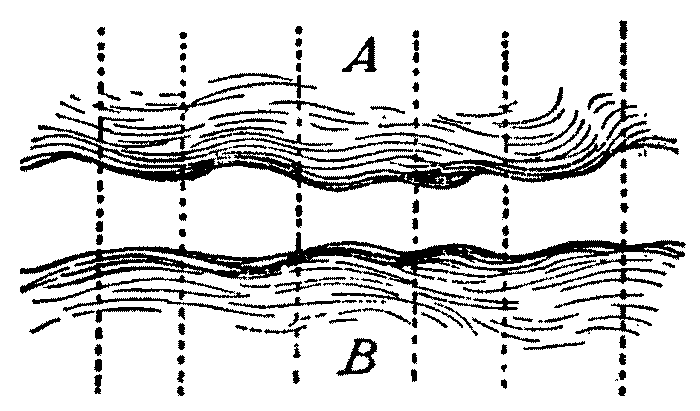September 20, 2021
Last week, I introduced students to the short passage in Saussure on “linguistic value” ([1915] 1966: 111-122 ). The high point of this passage is the illustration of the segmentation of thought.  I had always dismissed the easy and common critique for the apparent mentalism of the explanatopry paragraph. I always took all this as a model drawn to make us think (…), rather than as the description of a state of being or of some substance. Still, one cannot take Saussure literally when he writes:
I had always dismissed the easy and common critique for the apparent mentalism of the explanatopry paragraph. I always took all this as a model drawn to make us think (…), rather than as the description of a state of being or of some substance. Still, one cannot take Saussure literally when he writes:
this quote about the absence of “pre-existing ideas” is the basis for the extreme elaboration by Derrida in Grammatology,. This elaboration may be based on a misreading and yet had a massive consequence in the development of “deconstruction” and “post-modernism.”
“Without language thought is a vague, uncharted nebula. There are no pre-existing ideas, and nothing is distinct before the appearance of language…. Thought, chaotic by nature, has to become ordered in the process of its decomposition.([1915] 1966: 112)”
We now know, post Freud et al., as well as Bourdieu et al, that, as Geertz once put it:
“A century-and-a-half of investigations into the depths of human consciousness … have uncovered vested interests, infantile emotions, or a chaos of animal appetites, ([1967] 1973: 112)”
or a Bourdieu did, our psyches (personalities, identities) are shaped by:
“disposition inculcated in the earliest years of life and constantly reinforced by calls to order from the group, that is to say, from the aggregate of the individuals endowed with the same dispositions, to whom each is linked by his dispositions and interests” ([1972] 1977: 14-15). ”
So, our brains are not just “a vague, uncharted nebula.” But brains are not actually Saussure’s concern. What he wants us to ponder is: how are we to tell what our brains are signaling?
One student wondered, quite properly, about music as a medium possibly particularly well suited to express what we are experiencing, and better at this than words. I agreed with the sentiment, and taught the usual instance of the Saussurian (and Boasian) analysis by using our experience of light vs. the naming of the light into “colors.” Anthropologists have debated about this a lot more than about music (or the experiences produced by our other senses since we are now talking not solely about “brains” but also about “bodies”). This may be proof of anthropological “ocularcentrism” (a new distinction I just discovered in the spectrum of Western epistemological biases). As I wrote this and started thinking further about the other senses, I remembered my wonder at how specialist try to describe the taste(s) of wine . “classic expression of Cabernet Sauvignon, displaying dark fruit notes of raspberry, currant, and blackberry jam with subtle hints of cocoa.”
All our senses participate in producing our experience of life–including, and this is where anthropologists, as well as Saussurian linguists, add something essential, our experiences when finding out that we are not hearing well, not seeing some colors, or tastes when the (in-)ability has been labeled and then made consequential by a governing (hegemonic) institution or another. That is, not only do we experience what our senses are signaling but also our positions in the many social worlds we also live by.
Given all this, what is it Saussure can continue to tell to students apprenticing themselves to anthropology? That telling our experience, and imagining that of others, involve segmenting it into units that have a “form” but not a substance. “Green/blue,” “blue/red,” “(not) on the autism spectrum,” “getting an ‘A’ rather then a ‘B’ on a test,” all do much more (and much less) than communicating something about our visual acuity, our political affiliation, mental health, education.
And the segments produced by language are always:
. Arbitrary (not motivated by function)
. Arbitrary (the product of an institutional “arbiter” whether a king or obscure “authorities”)
. Drifting and in need of reconstruction
. Making history in an altogether Marxist sense
References
Bourdieu, Pierre [1972] 1977 Outline of a theory of practice. Tr. by R. Nice.. Cambridge: Cambridge University Press.
Derrida, Jacques [1967] 1997 Of Grammatology. Baltimore: John Hopkins University Press
Geertz, Clifford [1967] 1973 “The cerebral savage.” in The interpretation of cultures.. New York: Basic Books. pp. 345-359.
 Print This Post
Print This Post